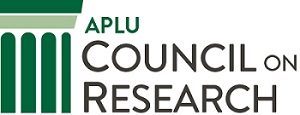
CoR NEWSJune 15, 2017
To: APLU Council on ResearchFrom: APLU CoR Staff
- Letter to HHS Secretary Price and OMB Director Mulvaney on Facilities and Administrative (F&A) Costs
- Letter to House Science Committee on Facilities and Administrative (F&A) Costs
- Letter to House and Senate Appropriators Urging Strong Support for EPA Office of Science and Technology (S&T)
- USPTO Director Resigns
- Update on NIH Actions to Stabilize the Biomedical Research Enterprise
- NIH OSP Launches New Website
- NAS to Study Return of Individual-Specific Research Results Generated in Research Laboratories
- NAS Value of Social, Behavioral, and Economic Sciences Report for NSF
- NAS Assessment of Advanced Research Projects Agency – Energy (ARPA-E) Report
- NSF Proposal & Award Policy Newsletter
- FASEB to Host Workshop on Responsible Communication of Basic Biomedical Science
- New AAAS FY 2018 R&D Appropriations Dashboard
- Registration Reminder for CoR Summer Meeting
- Letter to HHS Secretary Price and OMB Director Mulvaney on Facilities and Administrative (F&A) Costs
Yesterday, APLU sent a letter to Health and Human Services (HHS) Secretary Tom Price and Office of Management and Budget (OMB) Director Mick Mulvaney to express strong opposition to the Administration’s Fiscal Year 2018 budget proposal to cap the Facilities and Administrative (F&A) cost payments on National Institutes of Health (NIH) grants at ten percent. APLU is deeply concerned about the impacts the proposed F&A cap would have on the ability of our member institutions to conduct scientific research. F&A expenses are real costs of research, and capping F&A reimbursements would effectively mean cutting research.
APLU encourages your institution to send its own letter to Secretary Price (secretary@hhs.gov) and Director Mulvaney (ombdirector@omb.eop.gov) to detail how a cut to F&A payments would adversely impact research activities on your campus and limit your institution’s ability to conduct new research initiatives. To further our collective impact, we are looking to collect all university letters on F&A with the goal of packaging them together and sending them to lawmakers on Capitol Hill as well as the media. Please send a copy of your letter to FandAComments@aau.edu. Please direct any further questions you may have to Jennifer Poulakidas (jpoulakidas@aplu.org), APLU’s Vice President for Congressional and Governmental Affairs.
Last week, APLU along with five other organizations, sent a letter to the House of Representatives Science, Space & Technology Committee offering the perspective of research institutions on the topic of the Facilities and Administrative (F&A) costs of conducting federal research. The letter was submitted for the record for the House Science, Space and Technology joint Subcommittee hearing held on this issue on May 24, 2017.
- Letter to House and Senate Appropriators Urging Strong Support for EPA Office of Science and Technology (S&T)
Last week, APLU sent a university and organization sign-on letter to Senate and House appropriators urging strong funding for the EPA’s Office of Science and Technology in FY2018. The letter urges appropriators to “provide the EPA Office of Science and Technology (S&T) with $754 million, which would help restore funding for important research across the Nation.”
Last week, Michelle Lee resigned as Director of the U.S. Patent and Trademark Office (USPTO). Secretary of Commerce Wilbur Ross did not provide additional information regarding Lee’s resignation. Current USTPO Associate Solicitor Joe Matal will serve as Acting Director until a new Director is confirmed.
NIH recently sent the letter below announcing the launch of the Next Generation Researchers Initiative to bolster support for early-stage and mid-career investigators and to address long-standing challenges faced by researchers attempting to embark upon and sustain independent research careers:
Dear NIH Stakeholder,
I wanted to provide an update on NIH’s efforts to enhance funding to early-stage and mid-career researchers. After soliciting feedback on NIH’s plans in this area over the last month, we are taking a bolder, more focused approach to increase the number of NIH-funded early-stage and mid-career investigators and stabilize the career trajectory of researchers. The effort is called the Next Generation Researchers Initiative. We encourage you to learn more through the resources below and we look forward to an ongoing conversation on this important issue. You can provide feedback on this topic through the Open Mike Blog or send an email to publicinput@od.nih.gov.
Next Generation Researchers Initiative Web Page
Presentation to the Advisory Committee to the NIH Director
Best wishes,
Lawrence A. Tabak, D.D.S., Ph.D.
NIH Principal Deputy Director
The National Institutes of Health (NIH) Office of Science Policy (OSP) has recently launched a new website. The new website aims to more accurately reflect the divisions and programs that compose OSP and provides easier user navigation as well as enhanced functionality. If you have any questions or require further information, please contact the NIH Office of Science Policy at SciencePolicy@od.nih.gov.
On Monday, May 30, the National Institutes of Health (NIH), in collaboration with the Food and Drug Administration (FDA) and the Centers for Medicare and Medicaid Services (CMS), announced the launch of a study by the National Academies of Sciences, Engineering, and Medicine that will convene a committee to review and evaluate the return of individual-specific research results from research laboratories, which are required to be returned in accordance with the Clinical Laboratory Improvement Amendments of 1988 (CLIA). This committee will:
- Review and assess the current evidence concerning the benefits and harm to individuals and society regarding the return of individual-specific research results generated in research laboratories.
- Review the current regulatory environment, including CLIA and any other applicable laws, for conducting tests and returning individual-specific research results.
- Make recommendations on the issue of returning individual-specific research results generated in research laboratories that are regulated by CLIA.
To learn more about the importance of this study, please read the latest Under the Poliscope post by Dr. Carrie D. Wolinetz, NIH Associate Director for Science Policy. Additional information on the study can also be found on the NAS website. If you have any questions or require further information, please contact the NIH Office of Science Policy at SciencePolicy@od.nih.gov.
The National Academies recently released “The Value of Social, Behavioral, and Economic Sciences to National Priorities: A Report for the National Science Foundation,” a study requested by NSF in March. The report calls for NSF to develop a strategic plan specifying social, behavioral, and economic sciences research priorities. A discussion event is being planned for July, and further details will be shared when available.
On Tuesday, June 13, the National Academies’ Board on Science, Technology, and Economic Policy (STEP) released itslatest report,a detailed and in depth examination of the Advanced Research Projects Agency – Energy (ARPA-E).The report appraises the appropriateness and effectiveness of ARPA-E’s processes and operations to achieve its mission and goals. It also presents a retrospective and technical assessment of ARPA-E. The study’s committee of experts relied on quantitative and qualitative analyses to develop a set of findings and recommendations to the agency and to Congress.
The Policy Office in the Division of Institution & Award Support at the National Science Foundation is pleased to release the second quarterly NSF Proposal & Award Policy Newsletter, designed to provide information about upcoming changes and clarifications to policies and procedures that affect the preparation and submission of proposals and management of awards. Please let the NSF know of any feedback at policy@nsf.gov.
To promote a constructive dialogue on the responsible communication of basic biomedical research, the Federation of American Societies for Experimental Biology (FASEB) is holding a workshop on June 22, 2017, from 9:00 a.m. to 4:00 p.m. that will bring together scientists, science reporters, advocates, and other stakeholders. The workshop will feature a keynote presentation from Erika Check Hayden, a veteran science journalist and director of the Science Communication Program at the University of California, Santa Cruz. A series of discussions led by panelists will explore the effects of misrepresented or overstated (“hyped”) results on the biomedical research landscape as well as on public perception of science, the goals and pressures shaping the dissemination of research findings, and opportunities to improve communication practices. Members of the public can watch a videocast of the workshop on the NIH website. For more details, see the workshop agenda. The National Institute of General Medical Sciences is co-hosting the event.
Matt Hourihan and David Parkes of the AAAS R&D Budget and Policy Program have developed an interactive dashboard for following Congressional appropriations for science agencies and programs. The dashboard is set up to compare relative changes in the major funding accounts proposed by the White House and recommended by House and Senate appropriators (only White House figures are in there at the moment). The dashboard will be updated on at least a weekly basis, and as close to real-time updates as possible. Please feel free to share with anyone who might be interested.
We are headed to Reno! The APLU Council on Research (CoR) will meet from July 9-12, 2017 at The Silver Legacy Resort Casino in Reno, NV. Meeting highlights include a pre-meeting workshop for new and future Senior Research Officers (SRO) and a visit to the UNR Engineering Earthquake Lab. CoR sessions offer the chance to learn from and share ideas with invited speakers and colleagues from across North America. Session topics in 2017 will include matching innovation and capital for growth; technology transfer; large proposal development; breaking down silos between research centers and academic units; bringing the humanities and the sciences together; value proposition; open data and public access; controlled unclassified information; and the New Administration. We once again encourage each participating SRO to invite one Associate Vice Chancellor/President for Research, or future SRO, both to attend the meeting and participate in the pre-meeting “New and Future SRO” workshop – designed to build skills and address topics specific to this audience.
Registration information is available here, and the hotel reservation information is here. Be sure to book your hotel room by June 16 to lock in our discounted group rate.




Stay Connected
X (formerly Twitter)
Facebook
YouTube
LinkedIn
RSS